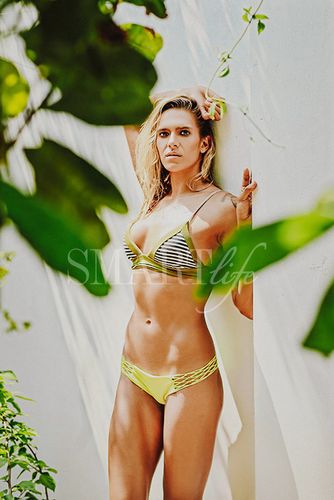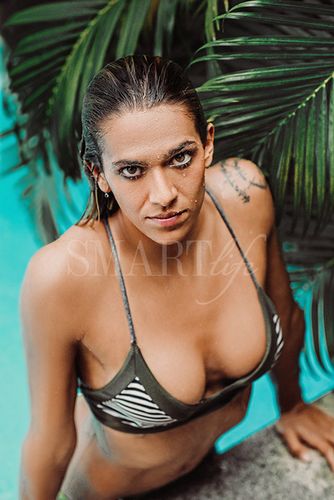Strange: adjective; meaning: unusual or surprising
As a first and second grader, Alexa Chitra Strange would dread the first day of school in San Clemente, along the coast of California. “Because the teacher would do the roll call and everyone would find out my last name is Strange and they would laugh at me. And, I would be so embarrassed,” she says. The students would make fun of her middle name—Chitra [after her aunt Suchitra who died young]—too. But her mother, Tara, told her that it was all about how she carried herself. “If you pretend like this is the coolest last name, I guarantee you people are going to think it is cool, too,” she remembers her mother telling her. And that is what she did when she walked into third grade. “I learned to turn that name into my armour,” she says. “I sort of learnt this lesson on how important it is to be confident in yourself and to love yourself.”
That lesson has stayed with her, and it showed when the US professional beach volleyball player strode in confidently, holding Tara’s hand, to meet us on an early February morning in Kochi. She was in Kerala for the inaugural season of the RuPay Pro Volleyball League, where she was one of the commentators. She also played in the all-star women’s match ahead of the PVL men’s final in Chennai, and was adjudged the player of the match, having scored the most points.
Clad in a black leotard with a skeleton print and workout pants, Alexa, 24, is a warm bundle of energy. But as you spend time with her, you realise that there is a different, vulnerable side to her. And that duality exists in her genetically—her mother is from Kerala, and her father, Greg, is from Georgia, US, with Scandinavian roots (his surname comes from Lestrange). While she is open about her family, her dreams and even her sexuality, there are parts of her that she would rather not reveal, like the meaning of the tattoo on her back. (She has two—the one on her left shoulder is inspired from The Lord of the Rings with an Aldous Huxley quote: “There is only one corner of the universe you can be certain of improving, and that is your own self.”; the other one is a more intricate one with Sanskrit text). “Only two people know about it,” she says. “In retrospect, if I could do it again, it would be cool to get it in Malayalam.” She is a two-time National Collegiate Athletic Association beach volleyball champion and an All-American (a title given annually to the best amateur players). But there is more to her than just volleyball—she draws, sews, cooks and bakes. She is layered, like any of us. A beautiful blend of dichotomies.
Perhaps, that is why Alexa felt out of place in America while growing up. “Don’t get me wrong, I love America,” she clarifies. “But, I felt like a misfit there, in a good way, like a stranger, just like my last name. I am a child of the universe and being biracial and all, I can get along with everyone. But I also have always felt alone in a sense, like it is the poetic soul in me.”
As she is saying this, Tara silently signals her not to, because “she thinks I am being self-deprecating”, says Alexa. And, that moment reflects their bond. It is relatable—like any mother, Tara is attuned to her daughter’s needs and is ready with advice. But, it is also different. It is deeper, closer, more open and more tactile because Tara is blind. Communication and touch are integral parts of their relationship—Alexa shares everything with her mother and still sits on her lap and showers her with kisses, even in public.
Tara was diagnosed with retinitis pigmentosa—a rare genetic disorder that gradually blinds you—when she was 23. By the time Alexa was born, Tara told her that “it was like looking through a straw”. Alexa initially did not realise that there was something different about her mother. It was only when she was eight that it struck her that her mother could not, say, take her shopping or drive her around, like other moms did. But Tara took her disability on the chin and did not let it dictate her life. “Her strength, independence and philosophy on the world inspire me, and she has given me the gift to see the world with a knowledge, clarity and insight that many never learn,” wrote Alexa in an Instagram post.
And, it is that clarity that has helped Alexa stay focused on her career as a beach volleyball professional.
Life is a beach
The backyard of the Strange household, says Tara, once resembled a boot camp, with kids from the neighbourhood lining up to be trained by her husband. A surfer, Greg comes from a typical All-American family—he and his cousins would play sports in college. And, therefore, it was no surprise that he would coach his three children—Andrew, Alexa and Aaron—too. “He taught them how to ski, snowboard, water ski,” says Tara. “He coached them till they were in high school.” So, Alexa was no stranger to sports from a young age, competing with her elder brother in basketball, baseball and American football.
But her volleyball journey did not begin in her backyard. It started during a father-daughter summer camp at an island off the coast of California. Alexa was eight then. “They had a volleyball net, and we played this game that was sort of like hybrid volleyball called ‘Jailbreak’, where you take the ball, call out someone’s name (from the other team) and throw the ball over the net, and if the other team does not catch it, then that person is out,” she explains. “I had never played it before and I just absolutely dominated the game.”
And, she wanted to keep playing, because of which Greg and Alexa ended up staying an extra day at the camp. “I had never experienced that type of feeling for sports,” she says. “I always loved being a competitor, but this was a sport that really clicked with me.” And, it happened on the beach, she recalls with a sudden realisation. When they got back home, Greg signed her up for volleyball. And, she started playing both basketball and volleyball in the sixth grade. While both sports had scholarships, she had to pick one once she reached high school as she did not want to spread herself too thin. And, volleyball it was.
Since there were no competitive leagues and scholarships for beach volleyball, Alexa’s initial focus was on the indoors, playing both as a hitter and a back row setter. She played indoors in Nebraska for a while, before getting a transfer to the University of Southern California (USC) to play beach volleyball. And, while she loved beach more, she says she is glad she got to experience both. She had a successful stint at USC, winning the national championship twice.
READ: Being fit for beach: Tips from Alexa Strange
But her sporting and creative sides came to a head when she graduated with two degrees (political science and economics). “Nobody talks about the existential crisis you go through in your early 20s once you finish college,” says Alexa. Till then, everything had been planned out for her—go to school, practise, get a scholarship, go to college, practise, play. So once she was done with college, she did not know what to do. Also, she comes from an academic family. Tara, she says, was a “classic Indian mom” who would have workbooks for her once she came home from school. Greg, on the other hand, would have decks of flash cards with multiplication tables for her. Tara would also order books on tapes—of fairy tales and Hindu and Greek mythology—for her, which gave Alexa a “lust for knowledge”. So, when she graduated, she was really conflicted: would she be able to use her mind and creativity if she went through the professional sports route? Or, would it stagnate? If she took the non-sporting route, would she be stuck in a nine-to-five job? And, would she be stuck in its complacent stability and not push herself? All these questions paralysed her so much that she became a babysitter.
It was around the same time that Alexa went through her “feminine mystique” phase. She was living in with her boyfriend and he implied that they could get married. That seemed tempting to Alexa as “I would not have to do too much”. “As women, it becomes very easy to allow our lives to evolve around the man we are with, and then our goals and dreams become secondary,” she explains. “And then you have kids and your life becomes about your children.” One fine day, that realisation hit her, and she called up her mother. Alexa told her about how she thought she was losing herself. Tara asked her to come home.
Alexa broke up with the guy, and threw herself back in survival mode after being away from the professional circuit for a year. “I knew I had to do that to put pressure on myself to really figure out what I wanted to do and not just cruise through life,” she says. “So when I did that, I started to think about when I was little. When I was a little girl, what did I want to do? It was sports.”
Once she knew what she wanted to do and acknowledged it, she had to tackle the fear of failure next. “This is something I have learned as I was going through the process—you cannot fail at something if you make a goal and then you just start to go for it,” says Alexa. “Things may not go exactly as you intended with that goal, but if you have a vision of where you want your life to go and you pursue it and that is your passion, you cannot fail.” And so, she started training last January for the beach volleyball season that starts in May. The first tournament she participated in was jointly conducted by the Association of Volleyball Professionals (AVP), which is the longest-running beach volleyball tour in the US, and the Fédération Internationale de Volleyball, which is the international governing body. “Just to qualify for the tournament, you have to beat other US teams and teams from other countries,” says Alexa. “And, I did it. That was just a huge stepping stone for me. That was sort of a reinforcement. God was trying to tell me, ‘you are on the right path’.”
Last year, Alexa focused on domestic tournaments, and not international ones that would have involved a lot of travelling and would require sponsors. She wanted to make a name for herself in the AVP. “The first year was about getting into it again,” she says. “And, the other thing is not only do you have to find your own sponsors, you have to select your own practices, hire your own coach, create your own training routine... everything is on you. So, it is very entrepreneurial. At first, it is very overwhelming.”
She had to find a partner she could commit to for an entire year. It is like finding a husband, says Alexa, someone you could communicate with and work through adversity. And, she did find a compatible partner in Emily Hartong. “Running a two-person team in beach volleyball is like running a business,” says Alexa. “I am stimulating my mind constantly. I am constantly looking for new opportunities. So, I am using my education in a very unique way.” Also, since she does modelling, working with brands requires being creative. “So, in doing that, I kind of get that creative fix that I was always searching for,” she says.
Having done well in the AVP and found a partner, Alexa has now shifted her focus to the international circuit. Like any sportsperson, her ultimate goal is to win an Olympic medal. But the road to the Olympics is fraught with hurdles, more so if you are in the US, the top beach volleyball country in the world. “At the international level, only two US teams can play in every tournament,” says Alexa. “So, if you are not one of those two teams, you cannot even play.”
That is when Alexa thought of playing for India. “I am half Indian. I know I have the skill. All I need is one other player who is willing to work to be better every single day,” she says. She had watched the Indian women’s indoor volleyball team play against China at the Asian Games last August. While they lacked understanding and certain fundamentals, she says, “In terms of athleticism, they were up there with everybody else.” So, in October, as the beach volleyball season was ending in the US, she started sending messages on Facebook to anyone and everyone remotely connected with volleyball in India. Alexa was keen on representing India not just because of her Indian roots, but also because it would provide her the opportunity to set the tone for female athletes in India and be more of an influence to little girls (she already coaches girls in the US, she says). Around the same time, she saw a post on badminton star P.V. Sindhu’s Instagram about the Pro Volleyball League, co-owned by Baseline Ventures and the Volleyball Federation of India. And, she contacted the PVL organisers. While they told her that she would not be eligible to play for India unless she gives up her US citizenship, they asked her to be a commentator for the league. She agreed, because, as she says, she had been constantly commentating life to her mother.
One for the family
Since the PVL was happening in Kerala, Alexa felt she had to bring Tara along. “What a wonderful gift to be able to bring my mom back to India, because of something that I have accomplished,” she says. Apart from her Olympic dream, Alexa has two goals: one, to build a house where she can stay with her parents; two, to fund a research on retinitis pigmentosa. It is her way of giving back to her parents for believing in her dreams. “The blessing of having such a strong, supportive family has allowed me to be fearless in pursuing dreams that are not necessarily stable and that take a lot of risk and perseverance and have ups and downs,” she says. And, her parents are equally supportive of her brothers, too—Andrew went to Harvard (economics), and Aaron plays volleyball for USC, where he is majoring in political science. While Greg, says Alexa, is an alpha male and the driving force of the family, Tara embodies the feminine energy and is nurturing and caring. “Between the two of them, there is this perfect balance of the two energies,” she says. “I believe in soul mates, and I think they are soul mates.” That they are, and it is quite evident in the way Greg, 58, has stood by Tara, 54, after she was diagnosed with retinitis pigmentosa. He has ensured that she did not miss out on anything because of the disorder, which is why one can find him commentating each move to her during Alexa’s matches. Greg, says Alexa, has set the bar high for her when it comes to finding a life partner.
What does she look for in a life partner? Soul. Alexa does not see gender; she is bisexual—“it is more like a human soul connection,” she says. And, she had no qualms about coming out on Instagram. She did go through a phase of denial and suppressed her sexuality at first, because she was a female athlete and did not want her teammates to look at her differently. She came out to her teammates while in junior college, and they were quite supportive. It was a little hard for her parents, especially Greg, to accept her sexuality. But they eventually did, she says, because they love her and because she was honest with them. And, that is why, she decided to post it on Instagram. “Because I know I am lucky to have parents who will understand, and some people are not,” she says. “And I think that is part of what social media is. It is not about showing off—look at my lifestyle and look at what I am doing—but about connecting.”
READ: This Indian state is Alexa's favourite travel destination
That reflects in her Instagram posts. While most of it is to do with beach volleyball, there are many posts on her family and art with detailed captions. There is a drawing of a naked woman with a Ganesha’s head with a line that reads: “It’s not obscene if it’s art #iamaweirdo.” Ganesha is her favourite Indian god—she also had a tapestry of him in her bedroom—because he is “the blocker of obstacles”. Then there is another drawing called ‘Treva’ (tree+Shiva). Art is a medium for her to express her Indian side. It also helps her deal with adversity, as does humour. Last March, Greg had a retinal detachment that left him blind in one eye. Between Greg and Tara, they now only have one functional eye. Alexa responded to the tragedy by drawing a card that showed a hand carrying four flowers shaped like eyeballs, three of which were wilted, with text next to it: “Eye’m pretty sorry.”
Like Alexa says, she has always thrived in adversity. Back in the US after her Kerala trip, she put up a post on Instagram with a bunch of volleyballs that read: “First day back at practice got me feeling like a happy girl with a lot of balls.” Alexa Chitra Strange is ready to roll this volleyball season.







